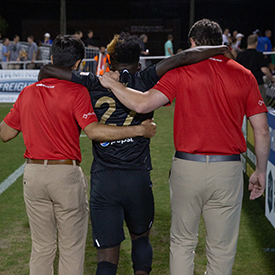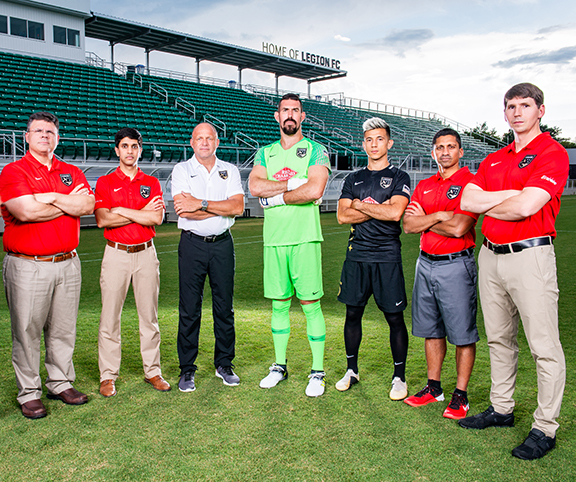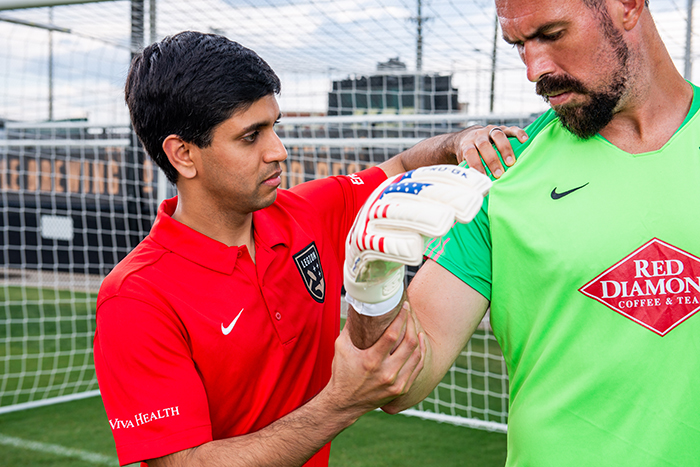 In addition to medicine, soccer is one of the great passions for Irfan Asif, M.D., chair of the UAB Department of Family and Community Medicine. Asif has played the sport since he was 5 years old, including at the collegiate level, and he still tries to kick the ball around recreationally at least once a week.
In addition to medicine, soccer is one of the great passions for Irfan Asif, M.D., chair of the UAB Department of Family and Community Medicine. Asif has played the sport since he was 5 years old, including at the collegiate level, and he still tries to kick the ball around recreationally at least once a week.
So when it was announced that a new professional soccer team, Birmingham Legion FC (football club), would begin playing in the city in 2019—with games to be held on the UAB campus, no less—Asif immediately wanted to be a part of it. Now he heads up the UAB Sports Medicine group that serves as official team physicians for Legion FC.
“One of the best things about this is I get to give back to a sport that helped me become the person I am today,” Asif says. “You think about teamwork, leadership, discipline—those are things I learned from soccer. I’m excited to contribute in helping other folks as they play the sport, by keeping them healthy and getting them back on the field after an injury.”
Legion FC is a member of the USL Championship league, which is only one level below top-tier Major League Soccer in U.S. The club plays its home games at UAB’s BBVA Field, where their medical needs are tended to by a mixture of primary care physicians and orthopedic surgeons from UAB Sports Medicine.
 UAB orthopaedic and sports medicine physicians serve as team doctors for the Birmingham Legion. From left (in red): Kennieth McCollough, Amit Momaya, Irfan Asif, and Michael Johnson.
UAB orthopaedic and sports medicine physicians serve as team doctors for the Birmingham Legion. From left (in red): Kennieth McCollough, Amit Momaya, Irfan Asif, and Michael Johnson.
“We’re definitely big fans of the team and want to see them succeed. But we’re also always on edge, watching to see if anybody gets hurt,” says Amit Momaya, M.D., head of the Sports Medicine division within the UAB Department of Orthopedic Surgery. “It helps that the players see us all the time and know us by name. That enhances the care we’re able to provide, because they feel very comfortable in talking to us. They trust us, and we trust what they’re telling us.”
This care actually begins well before Legion FC ever takes the field to play a game. UAB Sports Medicine physicians give all the players a preseason physical—complete with an EKG—and establish training programs during the offseason to help build stamina and prevent injuries.
“Soccer is an endurance sport, so there are a lot of things you need to think about with fitness,” Asif says. “Nutrition is a big factor. You need to make sure you have the fuel for performance. So we talk quite a bit about the things athletes should be eating to maximize their full potential.
“We work with the strength and conditioning coaches to try to come up with the ideal programs to promote not just their fitness on the field but injury prevention. Knee and hamstring injuries are common in the sport. So we design injury prevention programs during the offseason to try to minimize injuries during the season.”
When a player is injured, the UAB Sports Medicine team is responsible for treatments, including surgery, as well as any sort of rehab work needed to get the athlete back into playing shape. Steven Theiss, M.D., chair of the Department of Orthopaedic Surgery, says such work provides an enjoyable challenge for physicians.
“All sports medicine specialists are eager to care for elite athletes,” Theiss says. “Those patients are very motivated, and seeing them return and succeed in competition is the ultimate reward for sports medicine specialists.”
 UAB Sports Medicine Division Director Amit Momaya with Legion goalkeeper Matt VanOekel.
UAB Sports Medicine Division Director Amit Momaya with Legion goalkeeper Matt VanOekel.
Partnering with Legion FC is just one of the steps UAB Sports Medicine is taking to extend its services to both athletic teams and recreational athletes. The group recently became the official sports medicine provider for the Birmingham Vulcans rugby team, and Asif says they are actively looking for other teams and organizations to partner with as well.
In addition, there is movement to expand the number of Sports Medicine clinics. This effort includes the creation of UAB’s first sports and exercise medicine fellowship training program, which Asif says will help with both clinical and research activities.
“We’re planning on having a bigger footprint in the next two years that will focus not only on sports medicine in the elite athlete, but also sports exercise medicine,” Asif says. “My motto is, ‘Everyone can be an athlete.’ So we also want to take care of regular people and find ways to get them to exercise.
“We’ve had to do quite a bit with COVID-19 planning with both UAB and the Legion this year, which has been interesting. One of the biggest risks to playing if you’ve had COVID is risk for heart issues.”
All of this is something that UAB Sports Medicine has been doing for years with UAB Blazer Athletics. It is a relationship that has been enhanced recently with the national attention received by the success of the UAB football team.
“As we’ve seen the growth of UAB Athletics, we’ve grown right along with them,” Theiss says. “We work in close partnership with UAB Athletics. They support us and we support them in order to make both of us successful.
“Good sports medicine is a collaboration among the coaching staff, the training staff, the athletes, the medical staff, and the medical facilities. All those people have to work in concert in order to have a successful sports medicine program. That’s what we are continuing to build at UAB, in order to bring our Sports Medicine program to national prominence."
By Cary Estes